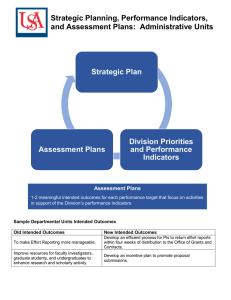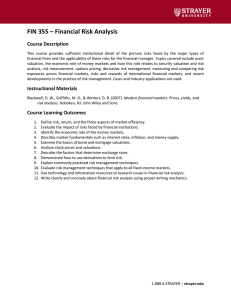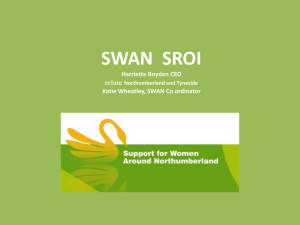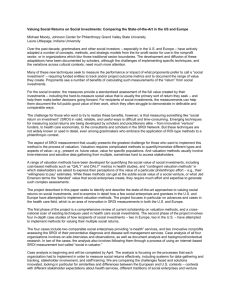A Presentation to Warwick University October 2013 Ben Carpenter
advertisement
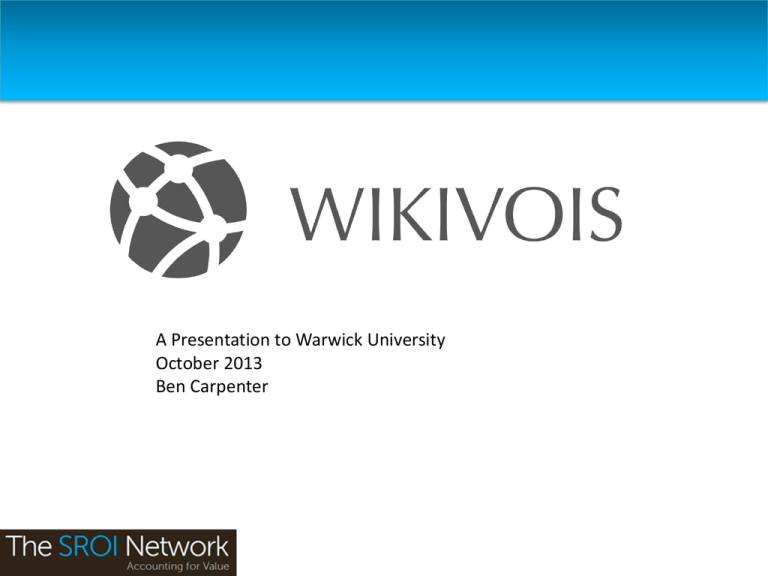
A Presentation to Warwick University October 2013 Ben Carpenter An Introduction Employed by The SROI Network Develop the www.wikivois.org website Job Role: “Information Researcher & Coordinator (Social Accountability)” Ben Carpenter LinkedIn: WikiVOIS t: @wikiVOIS & @benthecarpenter ben.carpenter@thesroinetwork.org Contents The Basics Who, What, Why etc. How does it Work? Demonstration, some examples. What Next? The future, any questions? What is WikiVOIS? • Wiki = a definition: “a web application which allows people to add, modify, or delete content in a collaboration with others. it differs from a blog or most other such systems in that the content is created without any defined owner or leader, and wikis have little implicit structure, allowing structure to emerge according to the needs of the users.” [http://en.wikipedia.org/wiki/Wiki] • WikiVOIS has the same concept. • and even has same software/appearance… for now! What is WikiVOIS? • VOIS = pronounced “voice” and stands for: • Values Outcomes Indicators and Stakeholders. • All entries on the site fall within these categories and they are based upon the structure and principles of the Social Return on Investment Methodology (SROI). www.thesroinetwork.org What is WikiVOIS? ‘Open source’ database FREE online resource Online community of 1200+ registered users Who is WIKIVOIS for? • Organisations looking to identify and value their social or environmental change. (Service Delivery Staff, M&E Officers, Senior Management, Boards) • Funders & Policy Makers (See where value is being created, what outcomes are really happening, what indicators are being used etc.) • Researchers (WikiVOIS becomes a platform for your work to be accessed by non-specialists) Why does WikiVOIS exist? Organisations tackling difficult social or environmental problems often: Struggle to evaluate their impact in a way that reflects the real outcomes or changes that occur. Lack access to information or examples of how to measure the value they are creating. Have difficulty putting a monetary value on their impact and the outcomes they achieve. Why does WikiVOIS exist? Also… Funders and Policy Makers often get a misrepresented view of change based upon the parameters set out for Measurement & Evaluation. Many Researchers are looking to get their work used outside of academic circles to influence policy. What does WikiVOIS aims to achieve? WikiVOIS provides greater consistency to measurement and evaluation practice. (sharing stories of change – creates a common language! Good practice is shared & debated especially in Valuations & Indicators.) WikiVOIS empowers stakeholders. (This “bottom up” approach allows the real experiences of stakeholders and organisations to be heard by others. We hope that this will lead to decisions about resource allocation and service delivery being more stakeholder-led and able to create greater value.) Bridges the gap between researchers and those delivering change – making their work more widely accessible. (Create a rich depository of research that can be accessed by organisations delivering social & environmental change) How does it work? WikiVOIS is based upon SROI Principles: www.thesroinetwork.org SROI is an approach to understanding and managing the value of an organisation’s activities: Measuring Impact. (It’s based on a set of principles that are applied within a framework. It is a framework that accounts for social value; the commonly used analogy is of financially accounting.) The impact of an organisation’s activities is the change as a result of them that occurs in the world around us and the worlds of those that are involved in the activities – Stakeholders! What changes for them? (SROI assesses how important each change is to whoever experiences them, and locks this value judgement into the analysis.) SROI accounts for values that are often excluded from markets. (For example; what is the value to a young person of “increased confidence”? Or “reduced feeling of isolation” for an elderly person. There are numerous methods for deriving this value including cost benefit analysis, revealed preference, stated preference etc.) NB: IMPACT MAP: Stakeholders > Outcomes > Indicators > Valuations How does it work? WikiVOIS: Hierarchical Diagram Outcomes (linked to stakeholders and in a domain) Indicators (linked to outcomes) Valuation (linked to outcomes) How does it work? Entries… A Complete Entry Set : Entering linked information in each category for example: A Stakeholder > An Outcome > An Indicator > A Valuation. An Incomplete Entry Set: Information has been added to one category but not all four. For example: A Stakeholder but no related Outcome. Or an Indicator is added (linked to an outcome) but not having a valuation. Fill in the gaps! An Approved Entry: Recognised as complying with the WikiVOIS entry protocols. Provides recognition of a standard – certain quality. How does it work? Entries… Rate an Entry! Encourage rating of entries – provide a steer a bit like trip advisor? Discuss an Entry! Facility to add comments and debates – especially useful around certain valuations etc. What’s in there now? Currently 2,321 entries. 69 Different Stakeholders, 658 different Outcomes (all linked to Stakeholders and within an Outcome Domain), 857 different Indicators (linked to outcomes) and 737 valuations (all linked to outcomes) Stakeholders Different people and organisations experience different outcomes and value them differently. It is possible to group people or organisations together and generalise these experience and values. http://www.wikivois.org/index.php?title=Category:Stakeholders Outcome Domains There are many different outcomes that stakeholders can experience from an activity. It is easier to analyse these by thinking about grouping outcomes together under different domains. http://www.wikivois.org/index.php?title=Category:Outcome_Domains Outcomes Outcomes are changes experienced by a group of stakeholders. They are changes that happen as a result of an activity and can be positive or negative and intended or unintended. Outcomes are usually part of a chain of events where an activity leads to an outcome which leads to another outcome and so on ad infinitum. http://www.wikivois.org/index.php?title=Special:RunQuery/Browse_Outcomes Indicators Indicators are measures that provide information on how much of an outcome is expected to happen or has happened. They can be based on information provided by those experiencing the outcome or from other sources. http://www.wikivois.org/index.php?title=Special:RunQuery/Browse_Indicators Valuations Outcomes can be more or less important to the stakeholders that experience them. A Valuation can assesses relative importance. Financial measures are used as a proxy for the value. Sometimes these proxies will relate to actual amounts of money but this is not necessary. http://www.wikivois.org/index.php?title=Special:RunQuery/Browse_Valuations A worked example… Create an account!! Become part of the Online Community… Joining takes less than a minute! Allows you to add content to the database! SROI Network Members are able to edit entries! What Next for WikiVOIS? Develop the usability! New website launches 09.12.2013! New features – improved functionality! Sneak preview: http://wikivois.sdesign1dev.co.uk/ Any Questions? Contact me ben.carpenter@thesroinetwork.org 0151 703 9229 Join the debate – stay in touch Search WikiVOIS
